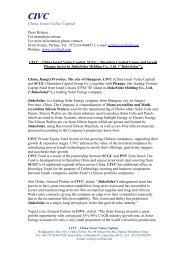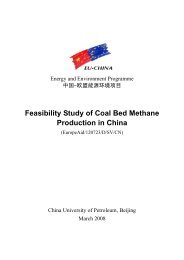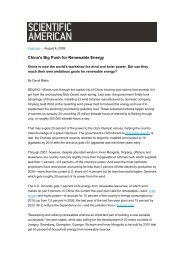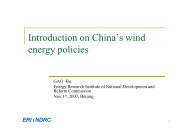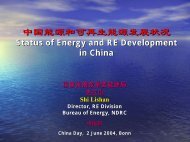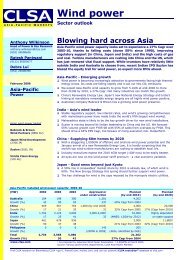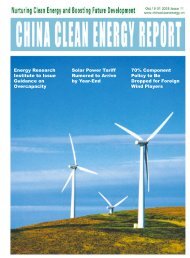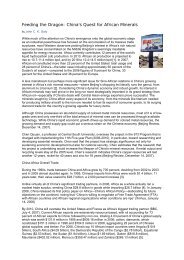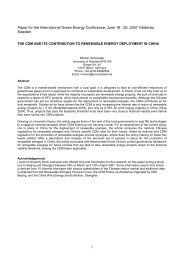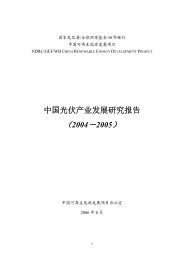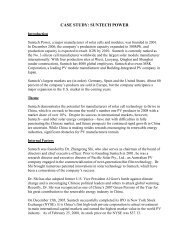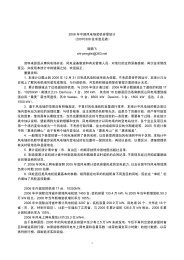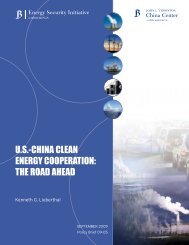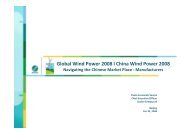LDK Solar Co., Ltd. - Asia Europe Clean Energy (Solar) Advisory Co ...
LDK Solar Co., Ltd. - Asia Europe Clean Energy (Solar) Advisory Co ...
LDK Solar Co., Ltd. - Asia Europe Clean Energy (Solar) Advisory Co ...
You also want an ePaper? Increase the reach of your titles
YUMPU automatically turns print PDFs into web optimized ePapers that Google loves.
operations or the price of our ADSs. SFAS No. 123R requires us to recognize share-based compensation as<br />
compensation expense in the statement of operations based on the fair value of equity awards on the date of<br />
the grant, with the compensation expense recognized over the period in which the recipient is required to<br />
provide service in exchange for the equity award. The additional expenses associated with share-based<br />
compensation may reduce the attractiveness of issuing stock options under our stock incentive plan. However,<br />
if we do not grant stock options or reduce the number of stock options that we grant, we may not be able to<br />
attract and retain key personnel. If we grant more stock options to attract and retain key personnel, the<br />
expenses associated with share-based compensation may adversely affect our net income.<br />
Risks Relating to Business Operations in China<br />
Changes in PRC political and economic policies and conditions could adversely affect our business and<br />
prospects.<br />
China has been, and will continue to be, our primary production base and currently almost all of our<br />
assets are located in China. While the PRC government has been pursuing economic reforms to transform its<br />
economy from a planned economy to a market-oriented economy since 1978, a substantial part of the PRC<br />
economy is still being operated under various controls of the PRC government. By imposing industrial policies<br />
and other economic measures, such as control of foreign exchange, taxation and foreign investment, the PRC<br />
government exerts considerable direct and indirect influence on the development of the PRC economy. Many<br />
of the economic reforms carried out by the PRC government are unprecedented or experimental and are<br />
expected to be refined and improved over time. Other political, economic and social factors may also lead to<br />
further adjustments of the PRC reform measures. This refining and adjustment process may not necessarily<br />
have a positive effect on our operations and our future business development. For example, the PRC<br />
government has in the past implemented a number of measures intended to slow down certain segments of the<br />
PRC economy that the government believed to be overheating, including raising benchmark interest rates of<br />
commercial banks, reducing money supply and placing additional limitations on the ability of commercial<br />
banks to make loans by raising bank reserves against deposits. Our business, prospects and results of<br />
operations may be materially and adversely affected by changes in the PRC economic and social conditions<br />
and by changes in the policies of the PRC government, such as measures to control inflation, changes in the<br />
rates or method of taxation and the imposition of additional restrictions on currency conversion.<br />
Changes in foreign exchange and foreign investment regulations in China may affect our ability to<br />
invest in China and the ability of our PRC subsidiary to pay dividends and service debts in foreign<br />
currencies.<br />
Renminbi is not a freely convertible currency at present. The PRC government regulates conversion<br />
between Renminbi and foreign currencies. Changes in PRC laws and regulations on foreign exchange may<br />
result in uncertainties in our financing and operating plans in China. Over the years, China has significantly<br />
reduced the government's control over routine foreign exchange transactions under current accounts, including<br />
trade and service related foreign exchange transactions, payment of dividends and service of foreign debts. In<br />
accordance with the existing foreign exchange regulations in China, our PRC subsidiary, Jiangxi <strong>LDK</strong> <strong>Solar</strong>,<br />
is able to pay dividends and service debts in foreign currencies without prior approval from the PRC State<br />
Administration of Foreign Exchange, or SAFE, by complying with certain procedural requirements. However,<br />
there can be no assurance that the current PRC foreign exchange policies regarding debt service and payment<br />
of dividends in foreign currencies will continue in the future. Changes in PRC foreign exchange policies may<br />
have a negative impact on the ability of our PRC subsidiary to service its foreign currency-denominated<br />
indebtedness and to distribute dividends to us in foreign currencies.<br />
Foreign exchange transactions by our PRC subsidiary under the capital account continue to be subject to<br />
significant foreign exchange controls. Subsequent to this offering, we have the choice, as permitted by the<br />
PRC foreign investment regulations, to invest our net proceeds from this offering in the form of registered<br />
capital or a shareholder loan into our PRC subsidiary to finance our operations in China. Our choice of<br />
investment is affected by the relevant PRC regulations with respect to capital-account and current-account<br />
foreign exchange transactions in China. In addition, our transfer of funds to our subsidiary in China is subject<br />
to approval by PRC governmental authorities in case of an increase in registered capital, or subject to<br />
22



